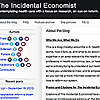
The Incidental Economist
385 FOLLOWERS
Contemplating health care with a focus on research, an eye on reform. A blog about economics, health policy, health services, health care, and politics.
The Incidental Economist
1d ago
If you or someone you love has a life-threatening food allergy, you have to remain constantly vigilant for even the slightest exposure to that food, making even an outing to a restaurant an impossibility for some people. It can be exhausting, particularly with children, and there’s no cure for food allergies. However, the FDA recently approved Xolair for the reduction of allergic reactions to food.
The post A Preemptive Strike on Food Allergy Reactions first appeared on The Incidental Economist ..read more
The Incidental Economist
1w ago
Measles is really contagious and can easily spread in pockets of unvaccinated people. In February 2024 a health advisory was issued by the Florida Department of Health in Broward County to warn the public about several confirmed cases of measles at a local elementary school. The Florida Surgeon General made the wrong call on recommendations to parents.
The post Measles: The Comeback Kid first appeared on The Incidental Economist ..read more
The Incidental Economist
1w ago
Veterans are prescribed opioids at higher rates for chronic pain, mental health issues, and substance use disorders than the general United States population. This puts them at increased risk for opioid-related adverse events and opioid use disorder. Responding to concerns for opioid safety, Veterans Health Administration implemented several initiatives including the Opioid Safety Initiative and a mandated case review for all Veterans who are prescribed opioids, facilitated by the Stratification Tool for Opioid Risk Management (STORM). STORM is a web-based dashboard to help assess a Veteran’s ..read more
The Incidental Economist
2w ago
Inspired by the White House’s request to ensure federal agencies equitably serve all eligible individuals and communities, the Partnered Evidence-based Policy Resource Center (PEPReC) developed an initiative to review, incorporate, and uplift a diversity, equity, inclusion, and justice (DEIJ) lens into their center’s work and culture.
Policy analysts at PEPReC drafted a policy brief that shares project-specific evaluation findings related to different health and access outcomes for different Veteran subpopulations and explains how policy changes could improve access to care and mortality risk ..read more
The Incidental Economist
2w ago
As America’s population grows older and more patients are diagnosed with Alzheimer’s and related dementias, the challenge of providing timely, effective, and comprehensive care grows. One of the key clinicians poised to play a major role in management and care for cognitive decline is the primary care provider (PCP). I have a new piece out in STAT News today looking at the role that PCPs will play in this growing crisis and ways that their training can be improved.
Many PCPs don’t feel comfortable assessing cognition. A 2020 survey conducted by the Alzheimer’s Association found that 40% of PC ..read more
The Incidental Economist
3w ago
The American healthcare debate is often a pendulum swinging between two extremes: maintaining the status quo and adopting a single-payer system. But what if we’re asking the wrong questions? What if the answers lie not in the extremes but in the nuanced experiences of other countries? We need to shift the conversation from what we’re against to what we’re for and, more important, what we’re willing to trade off to get there.
Thank to the Commonwealth Fund for supporting the production of this video.
The post Painful Truths the U.S. Can Learn from Global Healthcare first appeare ..read more
The Incidental Economist
3w ago
Cross-posted from the Health Services Research website.
Sponsored by: Department of Public Health Sciences, University of Virginia School of Medicine
Submission deadline for abstracts: Monday 17 June 2024
Health Services Research (HSR) and the Department of Public Health Sciences, University of Virginia School of Medicine are partnering to publish a Special Issue on The Role of Health Services Research in Cancer Prevention and Control. The special issue will be edited by Kevin Schulman, MD, Roger Anderson, PhD, Xin Hu, PhD, and Asal Pilehvari, PhD.
Paradigm shifts in cancer scre ..read more
The Incidental Economist
1M ago
In times of economic uncertainty and decline, we all take steps to be more frugal. Clipping coupons, spending less on entertainment and dining, or swapping out a favorite brand name good for a generic alternative won’t hurt you. But sometimes the lengths one can go to save money will.
When sick, some forego the doctor’s visit in favor of a cheap(er) over-the-counter remedy. Others ration an expensive prescription like insulin to make the supply last.
Deferring health care comes with a cost though – often to those who are already vulnerable. For younger and healthy adults, putting off an overdu ..read more
The Incidental Economist
1M ago
We love some good vaccine data, and we were pretty excited to see a new, long-term study published this month on cervical cancer outcomes after the HPV vaccine.
The post Ten Years Later: The HPV Vaccine is Still Incredible & Lifesaving first appeared on The Incidental Economist ..read more
The Incidental Economist
1M ago
According to a recent study, “Oreo Cookie Treatment” is better at lowering LDL cholesterol (the “bad” cholesterol) than high-intensity therapy with cholesterol-lowering drugs called statins. ARE OREOS A HEALTH FOOD NOW?!
The post Do Oreos Lower Cholesterol? No. first appeared on The Incidental Economist ..read more